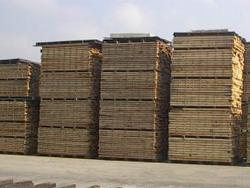Illegal Logging – China’s Big Wooden Problem
- Home
- News
-
Illegal Logging – China’s Big Wooden Problem
Beijing, China, July 9, 2007--Chinese wood manufacturers have poor records on using illegal timber. But the industry is changing, say Sarah Price and Matthew Brady, according to Ethical Corporation. Throughout the tropics, illegal logging and unregulated land clearance are decimating tropical forests. Weak governance and law enforcement in many countries contribute to a climate susceptible to illegal logging.
The international timber trade, especially the global demand for tropical timbers, has been part of the problem but it is also part of the solution. By increasing consumer demand for verified legal or sustainable tropical wood and wood products, the international timber trade has the potential to transform the forest products sector and governance structures in forest-producing countries. However, consumers must be willing to pay more for certified wood products and companies must be willing to support initiatives that encourage sustainable forest management in order to increase the availability of supply.
Given China’s recent emergence as a major export hub for wood products, consumers must demand that Chinese producers take responsibility for eliminating illegal and unknown-origin wood from their supply chains. A recent analysis conducted by Tropical Forest Trust concludes that a pairing of market incentives with technical assistance holds the key to eliminating illegally harvested wood from Chinese supply chains.
From being a net importer of many wood products in the 1990s, China is now a leading exporter of furniture, plywood and flooring and is rapidly moving up the ranks in exports of doors, windows and mouldings. China’s domestic wood consumption also increases significantly each year as the economy continues to develop.
Despite having the world’s largest plantation acreage, China imports vast quantities of wood to keep up with high levels of production. Russia is by far the largest supplier of logs and sawn wood to China, providing temperate softwood species mainly for the domestic housing market. For tropical wood, south-east Asia is the dominant supplier with 70% of the region’s hardwood exports heading for China. South America and central Africa also export significant quantities to China.
The nature of China’s wood distribution system is complex where individual farmers, small traders and small manufactures are all prominent players, and domestic and imported wood passes through numerous hands. Yet the number of private enterprises continues to increase, giving rise to intense competition, overproduction and excess capacity.
While China’s rise in international wood products trade is attributed to its price advantage, on an individual company level many manufacturers face tough conditions and are largely at the mercy of the market – from both the supplier and the consumer perspective. With increased import duties in both the US and European Union markets, and looming anti-dumping and World Trade Organisation action in both markets, Chinese producers are set to face a difficult road. A combination of economic incentives and disincentives will be necessary to encourage Chinese manufactures to incorporate legal or sustainable wood standards into their procurement policies.
Proving beyond doubt the legality of the timber in China’s manufacturing industry is extremely challenging. Most Chinese firms lack the capacity, desire or financial incentive to track their wood supply chains to ensure timber originated through legal means. Domestic issues are only compounded by the opacity of timber supply systems overseas.
One of the key characteristics of Chinese manufacturers is that they are extremely adaptable. Faced with economic incentives to change, they will. It only takes a few examples of “first movers” who are seen to be gaining an advantage by changing the way they operate for more companies to move in that direction.
Slowly an awareness of sustainability issues is emerging within China. A few Chinese manufactures have moved to adapt to market demands by more rigorously controlling their supply chains. The economic benefits of shorter (and more easily monitored) supply chains are compelling progressive manufacturers to make direct links with overseas timber suppliers that can provide full legal documentation. Organisations like the Tropical Forest Trust are working within factories, helping develop rigorous wood control systems to ensure supply chains contain only legal wood. Committed companies also support and encourage sustainable practices in the forests from which they source.
Clearly, the encouragement and support from buyers will be instrumental in transforming the Chinese industry away from its use of illegal timber. By demanding nothing less from China, the positive implications will be felt throughout the world.
